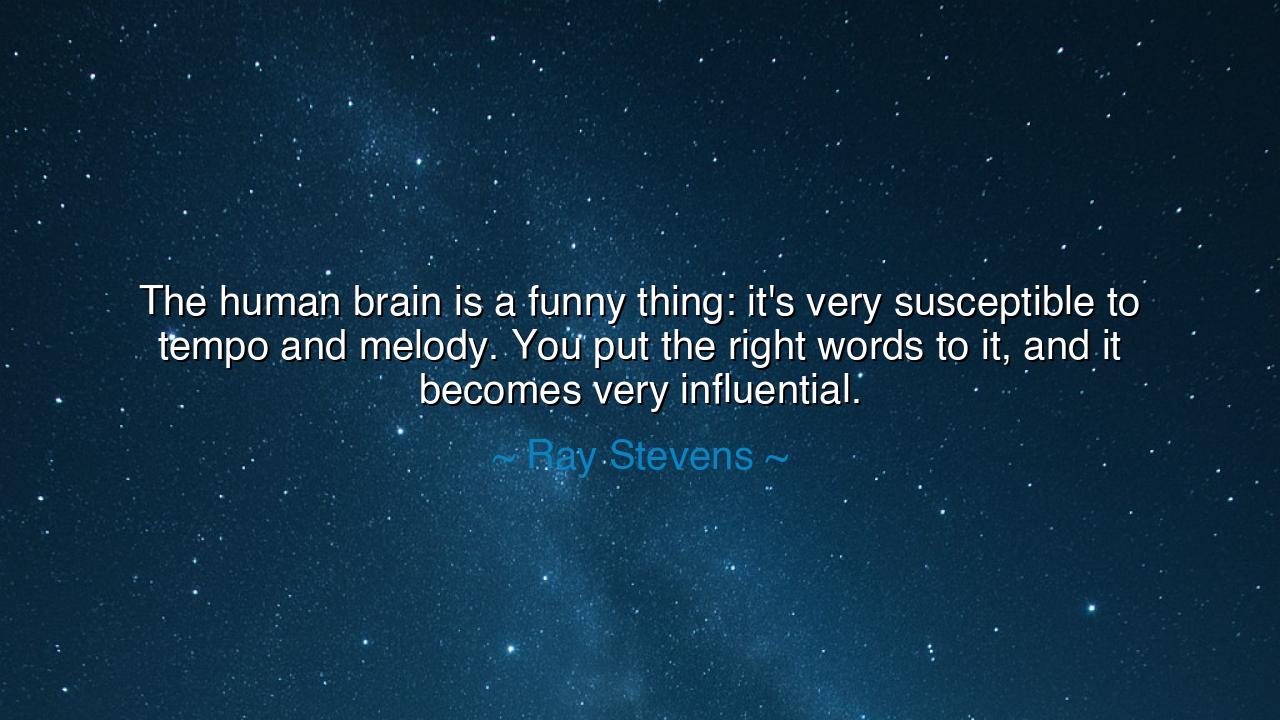
The human brain is a funny thing: it's very susceptible to tempo
The human brain is a funny thing: it's very susceptible to tempo and melody. You put the right words to it, and it becomes very influential.






“The human brain is a funny thing: it’s very susceptible to tempo and melody. You put the right words to it, and it becomes very influential.” Thus spoke Ray Stevens, musician and storyteller, whose humor and wisdom often hid beneath the simplicity of song. His words, though light in tone, echo one of the oldest truths known to humankind—that sound is not merely heard, but felt, and that music, in its rhythm and resonance, has the power to move both heart and mind. It is no accident that Stevens calls the brain “funny,” for what could be more curious than the way a simple tune can outlast reason, shaping thought long after silence has fallen?
In this reflection, Stevens reminds us that the human spirit is ruled not only by logic, but by rhythm. Since the dawn of civilization, people have gathered around the drum, the lyre, the voice of the poet—to remember, to believe, to be stirred. The brain, that delicate organ of memory and meaning, dances to patterns of sound, surrendering to melody and tempo as if they were sacred forces. The ancients called this the harmony of the spheres—the belief that the universe itself moved in music, and that human souls echoed its song. When words are joined to melody, their power multiplies; they bypass reason and travel straight to the heart.
Consider the great bards of old—Homer, who sang of Troy’s ruin and Achilles’ wrath; Orpheus, whose lyre could charm beasts and stones. Their power did not lie in words alone, but in rhythm, in tone, in the pulse that drew listeners into a trance of truth. A story told plainly may be heard and forgotten, but a story sung becomes immortal. Even now, in an age of machinery and noise, we find ourselves shaped by melodies—songs of rebellion, of love, of loss. They move us not because we analyze them, but because something ancient within us still remembers the music that gave birth to thought.
When Ray Stevens says that the brain is “susceptible,” he does not mean weak—he means human. We are beings of emotion as much as intellect. A melody can calm rage, awaken courage, or plant ideas that no argument could ever persuade. Tyrants have known this truth; so have prophets and revolutionaries. The song “La Marseillaise” once stirred a nation to freedom; the spirituals of enslaved peoples carried both hope and coded rebellion. In each case, the right words, bound to the right rhythm, became more than art—they became a movement.
The ancients also knew the danger of this influence. Plato, in his Republic, warned that music could shape the soul for good or ill. He wrote that the wrong kind of rhythm could corrupt the youth, while the right kind could build virtue and courage. This warning stands even today: for just as melody can elevate, it can also manipulate. A careless tune, a thoughtless lyric, may dull the conscience or glorify despair. To recognize the brain’s “funny” weakness for rhythm is also to accept responsibility—to guard what we feed it, and to create music that uplifts rather than corrupts.
Stevens, himself a craftsman of humorous and heartfelt songs, understood this power well. His music often made people laugh, but beneath that laughter, there was always meaning. Humor, when wedded to melody, disarms resistance. A listener who would reject a sermon will still hum a tune—and in that tune, the message finds a home. This is the alchemy of the artist: to bind truth to sound, to make wisdom sing. The ancient poets knew this, the troubadours knew it, and the great songwriters of our time still wield that same invisible power.
So, dear listener, learn this lesson well: guard the melodies that enter your mind, and honor the ones you create. Know that your thoughts, your hopes, even your beliefs, can be shaped by the tempo of the world around you. Choose your music as you would your company—with care, with love, with awareness. And if you are a creator of song, remember what Ray Stevens teaches: that music is not mere entertainment, but influence made audible.
Let your rhythm carry truth, your melody bear light, your words awaken goodness. For the human brain may indeed be “funny,” but it is also divine—a harp that vibrates to the music of existence. Tune it wisely, and the song it sings will echo far beyond your own time.






AAdministratorAdministrator
Welcome, honored guests. Please leave a comment, we will respond soon